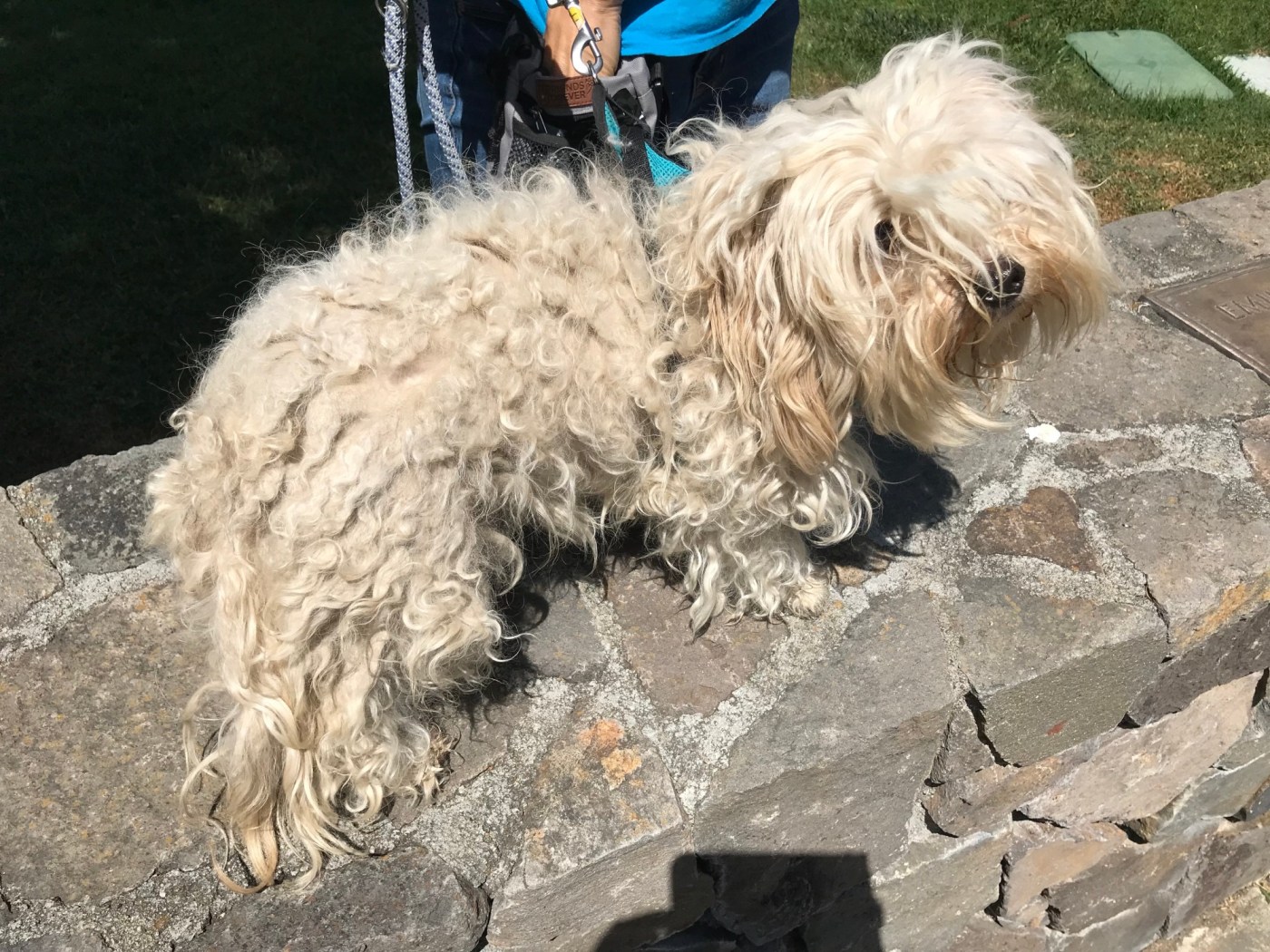Sadly, it’s not uncommon for animals whose care has been neglected to come through the doors of Marin Humane.
Some animals, especially dogs that have hair instead of fur — fur sheds, hair doesn’t — require regular grooming. It isn’t just for looks; it’s an important part of their overall health and comfort. And when their guardians fail to provide that, their hair or fur doesn’t just become messy, it can become painfully matted and seriously interfere with the quality of their life. Nails left untrimmed can get torn, stuck on things and even embedded into their paw pads, causing extreme pain and issues with walking.
Regular brushing helps remove dirt and keep hair and fur tangle-free. It allows you to check your pet for fleas, ticks and skin problems. And, of course, it cuts shedding way down. Finally, grooming can serve as a “mini checkup,” so you can spot lumps, bumps or any problems with an animal’s eyes, teeth and ears.
While both cats and dogs can require grooming, there are a few differences.
Cats
As anyone who’s had a cat can attest, they’re usually quite fastidious. They spend a great part of their day cleaning themselves. Their rough tongues are perfect for bathing themselves, so cats don’t usually require baths. But some kitties, especially ones with long hair, require brushing weekly, if not daily. Here are a few reasons why it’s important to brush your cat:
• To prevent matting. Mats can be extremely uncomfortable. Sometimes the only way to remove mats is by shaving them off. Never try to remove mats with scissors.
• To reduce shedding. Brushing helps reduce shedding by removing excess fur.
• To help you bond. Since most kitties enjoy being brushed, it’s a great time to bond with your feline friend.
• To help spread natural oils over your cat’s skin and coat. Brushing helps spread the oils their skin produces, keeping your kitty’s coat shiny and free of irritants.
• To help lessen hairballs. Some cats have problems with hairballs, especially ones with long fur.
Cats generally need their nails trimmed, especially if they don’t go outside. Special nail trimmers will help you to keep them trim without cutting the quick, which can be painful. If you’re not comfortable trimming your kitty’s nails, your veterinarian’s office will usually provide this service.
Dogs
Related Articles
Did a lost Salinas cat really walk home from Yellowstone National Park, or did he have help?
The beloved banana slug becomes California’s official state slug
Dad duty: Same-sex flamingo couple hatches egg, cares for chick at California zoo
7 Bay Area alternatives to Moo Deng, the viral baby hippo
Vet wants San Jose cat to be sedated before every visit; owner looks for alternatives
Unlike cats, dogs don’t really bathe themselves. Often this can be done at home or at self-serve dog-washing stations at pet stores. In general, dogs with long fur or hair need professional grooming. As noted above, dogs that have hair as opposed to fur, like poodles, shih tzus, etc., don’t shed; their hair keeps growing and needs regular trims. And, like cats, dogs need their nails regularly trimmed.
Often people opt to go with a professional groomer. Before selecting one, be sure to tour the facility to make sure it’s clean and safe and that staff appear knowledgeable and caring.
To ensure grooming goes smoothly, get your dog or cat used to the feeling of being touched, both on their bodies and their paws. Start when they’re young. If you’re trying to get an adult used to it, begin by gently massaging their coat as you feed them. Gradually introduce a brush or comb and reward your pet for cooperating. The more comfortable they feel with grooming, the better they’ll tolerate it.
Part of being a good pet parent is taking care of all our animals’ needs, including their lovely locks and fine fur.
Lisa Bloch is the marketing and communications director for Marin Humane, which contributes Tails of Marin articles and welcomes animal-related questions and stories about the people and animals in our community. Go to marinhumane.org, email lbloch@marinhumane.org or find us on social media @marinhumane.












